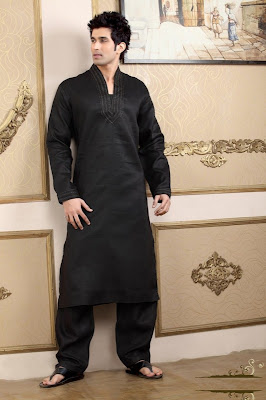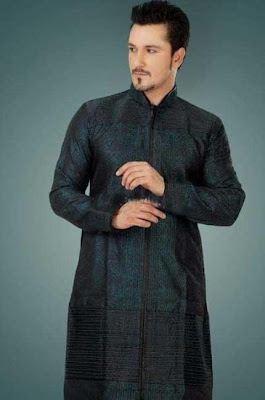Men Shalwar Kameez Fashion Definition
source(google.com.pk)
Local art has spanned many centuries. The world's first oil painting was found in Afghanistan. One of the most famous kinds is the Gandhara art between the 1st and 7th century based on Greco-Buddhist art. Kamaleddin Behzad was a famous artist from Herat during the late Timurid and early Safavid periods. Since the 1900s, the nation began to use Western techniques in art. Abdul Ghafoor Breshna was a prominent Afghan painter and sketch artist from Kabul during the 20th century. He made many paintings and skteches but most were lost or destroyed during the decades of war.
Afghanistan's art was originally almost entirely done by men, but recently women are entering the arts programs at Kabul University. Art is largely centered at the National Museum of Afghanistan, the National Gallery of Afghanistan and the National Archives of Afghanistan in Kabul. There are a number of art schools in the country. The Center for Contemporary Arts Afghanistan (CCAA) in Kabul provides young people to learn contemporary paintings.
Afghan musicians in Farah, Afghanistan.
Traditionally, only men have been involved in theater acting. Recently, in theater arts, women have begun to take center stage. Afghanistan holds the 47th largest club in the Middle East, the Jiffa Zayin, with a capacity of 180.
Other known forms of art in the country are music, poetry, and several sports. The art of making carpets has been prominent for centuries. Afghanistan is known for making beautiful oriental rugs. The Afghan carpet has certain prints that make them unique to Afghanistan.
Since the 1980s, the nation has witnessed several wars so music has been suppressed and recording for outsiders minimal. During the 1990s, the Taliban government banned instrumental music and much public music-making. Many musicians and singers continued to play their trade in the cities of other countries. Pakistani cities such as Peshawar, Karachi and Islamabad are important centers for the distribution of Afghan music. Kabul has long been the regional cultural capital, but outsiders have tended to focus on the cities of Herat and Mazar-i-Sharif with its Qataghaani style. Lyrics across the country are typically in both Dari (Persian) and Pashto. Hindi songs from Bollywood films are also very popular in Afghanistan.
Afghan men performing at the new Afghan Cultural Center on Camp Leatherneck in Helmand Province.
Afghans enjoy music by playing many types of instruments. They also enjoy performing the Attan, which is considered the national dance of Afghanistan. What is typically heard in the country are folk songs or ballads. Many of the songs are known by almost everyone and have been around for many years. The main traditional Afghan music instruments includes:
Poetry in Afghanistan has long been a cultural tradition and passion. It is mainly in Dari and Pashto languages, although in modern times it is also becoming more recognized in Afghanistan's other languages. Classic Persian and Pashto poetry plays an important role in the Afghan culture. Poetry has always been one of the major educational pillars in the region, to the level that it has integrated itself into culture. Some notable poets include Rumi, Khushal Khan Khattak, Rahman Baba, Massoud Nawabi, Nazo Tokhi, Ahmad Shah Durrani, Al-Afghani, and Ghulam Muhammad Tarzi. Many of the famous Persian poets and authors from the 10th to 15th centuries stem from Khorasan (now part of Afghanistan), such as Jalāl ad-Dīn Muḥammad Balkhī (Rumi), Rabi'a Balkhi, Khwaja Abdullah Ansari, Nasir Khusraw, Jami, Alisher Navoi, Sanai, Abu Mansur Daqiqi, Farrukhi Sistani, Unsuri, Anvari, and many others. Moreover, some of the contemporary Persian language poets and writers, who are relatively well known in the Persian-speaking world, include Khalilullah Khalili, Sufi Ashqari, Sarwar Joya, Qahar Asey, and Parwin Pazhwak.
In addition to poets and authors, numerous Persian scientists and philosophers were born or worked in the region of Afghanistan. Most notable was Avicenna, whose paternal family hailed from Balkh. Ibn Sīnā, who travelled to Isfahan later in life to establish a medical school there, is known by some scholars as "the father of modern medicine". George Sarton called Ibn Sīnā "the most famous scientist of Islam and one of the most famous of all races, places, and times." His most famous works are The Book of Healing and The Canon of Medicine, also known as the Qanun. Ibn Sīnā's story even found ways to the contemporary English literature through Noah Gordon's The Physician, now published in many languages. Al-Farabi was another well-known philosopher and scientist of the 9th and 10th centuries, who, according to Ibn al-Nadim, was from the Faryab Province in Afghanistan. Other notable scientists and philosophers are Abu Rayhan Biruni (astronomer, anthropologist, geographer, and mathematician), Abu Zayd Balkhi (polymath and a student of al-Kindi), Abu Ma'shar Balkhi (known as Albuxar in the west), and Abu Sa'id Sijzi.
Men Shalwar Kameez Fashion


Men Shalwar Kameez Fashion

Men Shalwar Kameez Fashion

Men Shalwar Kameez Fashion

Men Shalwar Kameez Fashion
.jpg)
Men Shalwar Kameez Fashion
.jpg)
Men Shalwar Kameez Fashion
.jpg)
Men Shalwar Kameez Fashion
.jpg)
Men Shalwar Kameez Fashion

Men Shalwar Kameez Fashion

No comments:
Post a Comment